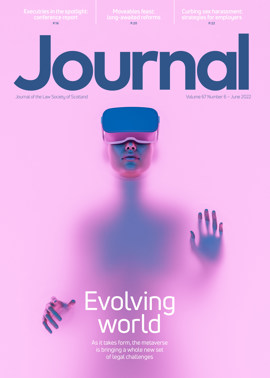The metaverse – a new world for rights

The word “metaverse” was shortlisted by Collins Dictionary for its Word of the Year in 2021. If you are not yet familiar with the word, its shortlisting is surely a sign that you soon will be. If you are familiar with the word, but are not quite sure what it means, you are not alone. The word has existed for a couple of decades, but entered the public lexicon last year when the CEO of Facebook (now aptly known as Meta) predicted the metaverse as the next frontier in technological advancement. In the months since then, there has been widespread discussion of the concept.
In reality, the metaverse is currently not much more than an idea, albeit one which is quickly evolving. For this reason, the concept of the metaverse does not lend itself well to a lawyer’s inclination to define with precision exactly what is meant by it. However, broadly speaking, the metaverse is describing the shift of various parts of a person’s life from the physical reality to an immersive virtual reality. It is envisioned as a digital space where we can interact with virtual objects and people in real time. It is the internet, but with an enhanced immersive dimension.
There is not yet a single unitary metaverse experience. The gaming industry has been at the forefront of developing metaverse-like environments, with games like Fortnite and Roblox placing users in extensive virtual worlds where they can interact with other users. Rapid advances are underway in other industries, with the potential to change drastically the way we shop, socialise, work, consume content and live our lives.

As with other recent technological advancements, the increasing prevalence of the metaverse will raise legal issues across a wide range of specialisms. At the forefront of these issues is likely to be intellectual property. What follows is a brief overview of the opportunities and risks for businesses and consumers in the metaverse relating to intellectual property. It is by no means exhaustive, not least because the development of the metaverse in the coming years is likely to present countless challenges not yet contemplated.
Brands in the virtual world
Virtual realities present opportunities for businesses to extend their reach into new industries and consumer bases. Brands, particularly in the fashion, sports and entertainment industries, are increasingly seeking to establish a presence in the metaverse by taking advantage of new virtual advertising opportunities and by collaborating with platforms to offer digital branded items or services to consumers. Though outside the scope of this article, it is worth highlighting the growth of the NFT (non-fungible token) market over the past two years, which demonstrates an insatiable appetite from consumers for digital branded assets.
Content: ever more channels?
The consumption of online content has become a staple part of our lives, whether by streaming music and television shows, scrolling social media feeds or subscribing to our favourite YouTube channel. Life in the metaverse is likely to amplify opportunities for creators to exploit their content by presenting new channels for consumption by consumers, but it also raises questions for licensees around the scope of rights they may have been granted in content licences which predate considerations around the metaverse. Given the uncertainty about how the metaverse may develop in the future, we may in the coming years observe a tension between proprietors seeking narrow licensing provisions to ensure they can exploit each new emerging use case, and licensees seeking sufficiently broad licences to adapt to emerging use cases.
It is common, for example, for licences to be granted on a territorial basis, so prior to any metaverse-related exploitation of content, territorial definitions included in licences will need to be considered to ensure use in the metaverse is permitted. It is entirely possible that practice will develop whereby metaverse use is carved out to be licensed separately, in a similar manner to the emergence of new monetisation opportunities in the past, such as entertainment licensing for air travel.
Another example is where a licensee has been granted exclusivity in relation to a particular use case for the licensed content. We may see licensors increasingly seek to argue that metaverse use falls outside the scope of the exclusivity, since it was not envisioned at the time the licence was granted.
Businesses will need to consider carefully whether they have appropriate rights to exploit content in the way they intend to in the metaverse. The introduction of new methods to exploit content has in the past led to disputes between the parties and it is likely that use in the metaverse will be no different, while also bringing novel legal questions and challenges as yet unforeseen in the content licensing arena.
Your metaverse persona
The creation of a virtual world necessitates creation of virtual people to inhabit it. Individuals using virtual reality technology tend currently to be represented by cartoonish avatars which bear little resemblance to the people they are embodying. However, this is expected to change as “deepfake” technology becomes more advanced and more widely available. Deepfakes enable sophisticated re-enactment of an individual’s face, face swapping between two individuals and even re-creation of an individual’s voice.
While this presents opportunities to make the metaverse experience even more immersive, as we come into contact with virtual avatars of our friends, family and colleagues, it is not difficult to imagine the prospect of deepfakes being deployed for more nefarious purposes, such as taking on a person’s virtual identity to give the impression that the person made comments or took action (such as criminal activity) which they in fact had nothing to do with. This has clear implications for the reputations of individuals, and particularly those in the public eye, but also more broadly.
It will be important that the law offers sufficient routes to tackle the improper use of deepfakes. In the US, the “right of publicity” will likely offer recourse for individuals in certain circumstances to prevent unauthorised use of a person’s name, likeness and voice, but no equivalent right exists under Scottish or English law. Instead, tackling improper use of deepfakes will likely involve action under a patchwork of laws, depending on the circumstances in question, some of which go beyond the scope of this article.
For example, where a deepfake is produced using existing footage of an individual, the owner of the copyright in the footage may be able to bring an action for copyright infringement, although the owner may not always be the individual featured, which complicates matters. In some circumstances, defamation may be an appropriate route for recourse and where a deepfake is used in relation to endorsement of a product, an action for passing off may be available.
Fraudulent use of deepfake technology is an issue largely untested as yet by the courts, but if, as is predicted, its use grows in tandem with the metaverse, it seems almost inevitable that disputes will follow.
Tip of the iceberg
While the metaverse in its final form may not yet be in existence, or even understood, what is clear at this stage is that a new metaverse-shaped landscape is on the horizon and shows no sign of slowing. If the issues set out in this article represent the tip of the iceberg in terms of intellectual property considerations for businesses and consumers entering the metaverse, it is to be expected that new and as yet unforeseen challenges will surface from the currently submerged depths of that iceberg, as the metaverse becomes more and more fully realised in the years to come.
Perspectives
Features
Briefings
- Criminal court: Hunted within the law?
- Corporate: The Register of Overseas Entities
- Intellectual property: A new era for the internet
- Agriculture: Tenant gives notice then pleads for stay
- Succession: Challenging valuations
- Sport: FIFA guide boosts women’s football
- Property: Property lawyers unite!
- Data protection: Privacy– recent enforcement highlights
- In-house: From Windrush to Waltham Forest







